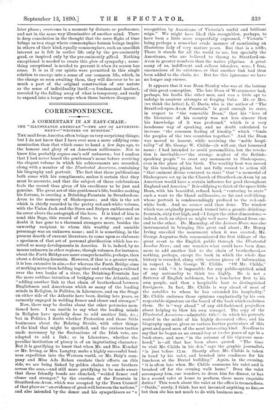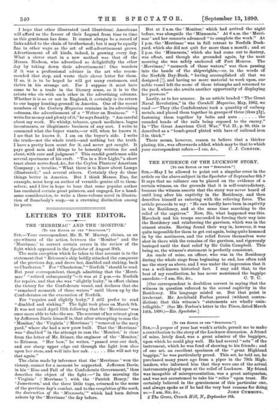CORRESPONDENCE.
munication than that which came to hand a few days ago, to the honour and glory of an American millionaire. Not to know him probably argues one's self unknown ; but I confess that I had never heard the gentleman's name before receiving the elegant volume in which his achievements are recorded, along with a number of the Illustrated American, containing his biography and portrait. The fact that these publications both come with his compliments, makes it certain that they must be accurate, and that the subject of these celebrations feels the record thus given of his excellence to be just and genuine. The great act of this gentleman's life, besides making his fortune, is erecting a Drinking-Fountain in Stratford-on- Avon to the memory of Shakespeare ; and this is the act which is chiefly recorded in the pretty red-and-white volume, with the Union Jack and the Stars and Stripes emblazoned on its cover above the autograph of the hero. It is kind of him to send this Saga, this record of fame, to a stranger; and no doubt it has gone to a thousand strangers more, besides the unworthy recipient to whom this wealthy and amiable personage was an unknown name ; and it is something, in the present dearth of current literature, to come upon so elaborate a specimen of that art of personal glorification which has re- ceived so many developments in America. It is, indeed, by no means unknown in other regions; though volumes, for instance, about the Forth Bridge are more comprehensible, perhaps, than about a drinking-fountain. However, if that is a greater work, it is less extensive in aim,—for whereas the Forth Bridge aims at nothing more than holding together and extending a railroad over the two banks of a river, the Drinking-Fountain has the more sublime intention of bridging over the Atlantic, and "adding another link to that chain of brotherhood between Englishmen and Americans which so many of the leading minds in Religion, in Politics, in Literature, and on the Stage .on either side of the Atlantic have been, during late years, so earnestly engaged in welding firmer and closer and stronger."
Now, there may be doubts about the other potencies men- tioned here. I am unable to say what the leading minds in Religion have specially done to add another link, &c. ; but in Politics, I doubt whether Protection and those little businesses about the Behring Straits, with other things of the kind that might be specified, and the curious tactics made necessary by the fluctuations of the Irish vote, are adapted to add a link ; or in Literature, whether the peculiar institution of piracy is of an ingratiating character. But it is gratifying to know that when Mr. and Mrs. Kendal' -or Mr. Irving, or Mrs. Langtry, make a highly successful busi- ness expedition into the Western world, or Mr. Daly's com- pany and Miss Ada Rehan emulate their efforts on this side, we are being linked by golden chains to our brothers across the seas,—and still more gratifying to be made aware
that these friendly bonds are clenched, "welded firmer and 'closer and. stronger," by the erection of the Fountain in Stratford-on-Avon, which was accepted by the Town Council of that place as " an evidence of good-will between the nations," and also intended by the donor and his sympathisers as " a
recognition by Americans of Victoria's useful and brilliant reign." We might have liked this recognition, perhaps, to have been a little more respectfully expressed, " Victoria" being perhaps a somewhat crude manner of mentioning an illustrious lady of very mature years. But that is a trifle. There it stands for all the world to see, but specially the Americans, who are believed to throng to Stratford-on- Avon in greater numbers than the native pilgrims. A great many of us, indifferent and callous islanders, were, I fear, unconscious of its existence, or that another link had thus been added to the chain, &c. But for this ignorance we have no longer any excuse.
It appears that it was Dean Stanley who was at the bottom of this great conception. The late Dean of Westminster had, perhaps, his faults like other men, and was a little apt to indulge in amateur attempts at forging links. Mr. or Mrs. (we think the latter) L. C. Davis, who is the author of The Stratford-upon-Avon Fountain," is good enough to state, in respect to " the venerable Dean," that his " love of the literature of his country was not less sincere than his knowledge of it was profound," which is a very handsome way of speaking, and no doubt calculated to increase " the common feeling of kinship " which " binds the peoples of the two countries together." And the Dean was moved to lament, while receiving the "noble hospi- tality" of Mr. George W. Childs—(it will out, that honoured name : I had intended to avoid personalities, but the revela- tion is inevitable)—" the strange neglect of the British- speaking people" to erect any monument to Shakespeare, even in the place of his birth. The wealthy host was moved by this touching plaint, but not fully roused to action till " that eminent divine ventured to state " that " a memorial of Shakespeare set up in the Church of Stratford-on-Avon by an American would have a certain influence for good throughout England and America." It is edifying to think of the spare little Dean, with his beautiful, refined head, "venturing to state" such a want to the bland millionaire, so fat and well-liking, whose portrait is condescendingly prefixed to the red-and- white book. And no sooner said than done. The window which was originally proposed, turned into a granite drinking- fountain, sixty feet high, and—I forget the other dimensions,— indeed, such an object as might well move England from one end to the other. Dr. Macaulay, of the Leisure Hour, was also instrumental in bringing this great end about ; Mr. Henry Irving unveiled the monument when it was erected ; Mr. George Augustus Sala communicated the first tidings of the great event to the English public through the Illustrated London News ; and one wonders what could have been done more to add another link to the chain of brotherhood,— nothing, perhaps, except the book in which the whole fine history is recorded, along with various pieces of information in respect to Mr. George W. Childs. " Of Mr. Childs," we are told, " it is impossible for any public-spirited mind of any nationality to think too highly. He is not a flatterer of English noblemen, but a benefactor first to his own people, and then a hospitable host to distinguished foreigners. In fact, Mr. Childs is way ahead of most of the notables to whom he has extended his hospitality." Mr. Childs endorses these opinions emphatically by his own respectable signature on the board of the book which enshrines them. He is " way ahead " of any old-fashioned prejudices about helping to blow his own trumpet. The copy of the Illustrated American—admirable title !—in which his portrait, seated in the midst of his highly decorated office, and his biography appear, gives us various further particulars of this great and good man of the most interesting kind. Needless to say that he began as an errand-boy at twelve years of age in a book-store, and now, " in the autumn of his vigorous man- hood," is—all that has been above quoted. " The time to visit Mr. Childs in his den," says the graphic journalist, " is just before 12.m. Shortly after, Mr. Childs is taken in hand by his valet, and brushed into readiness for his
luncheon at the Drexel building." Again, in the evening, " it is often late when Mr. Childs summons his valet and is
brushed off for the evening walk home." Does the valet accompany him, one wonders, to dress him for dinner, or has he a second valet at home to perform these more exquisite duties ? This touch about the valet at the office is tremendous. " Ouida," surely, I think, has not invented anything so fine,— but then she has not much to do with business men. , I hope that other illustrated (and illustrious) Americans will afford us the favour of their Legend from time to time as this gentleman has done. It cannot always be a record of links added to the chain of brotherhood; but it may be equally fine in other ways as the art of self-advertisement grows. Advertisement of all kinds, indeed, is growing every day. What a clever start in a new method was that of the Messrs. Hudson, who advertised so delightfully the other day by taking down their advertisement ! One wonders if it was a professional adviser in the art who recom- mended that step, and wrote their clever letter for them. If so, it is to be hoped he will get many customers, and thrive in his strange art. For I suppose it must have come to be a trade in the literary sense, as it is to the artists who vie with each other in the advertising columns. Whether it is so or not in England, it certainly is (to return to our happy hunting-ground) in America. One of the recent numbers of the Century Magazine contains in its advertising columns, the advertisement of a " Writer on Business." " I write for money and plenty of it," he says frankly. " Am careful about my work. No whisky, tobacco, quack medicines, bogus investments, or illegitimate business of any sort. I write to commend what the buyer wants,—or will, when he knows it.
I see that he knows it. I am on the buyer's side. I write the truth—not the whole truth—and nothing but the truth.
I have a pretty keen scent for it, and never get caught. It pays good men and things to be honestly written for and about, with care and judgment." This candid gentleman adds several specimens of his craft. " Tea in a New Light," a short tract about nerve-food, &c., for the Ceylon Planters' American Company ; a treatise, " What there is to Know about Lamps (illustrated)," and several others. Certainly they do these things better in America. But I think Messrs. Eno, for example, must keep an author of versatile genius all to them- selves ; and I live in hope to hear that some popular author has emulated certain great painters, and engaged, for a hand- some consideration, to write a three-volume novel in illustra- tion of Somebody's soap,—as a crowning distinction among its peers.







































 Previous page
Previous page